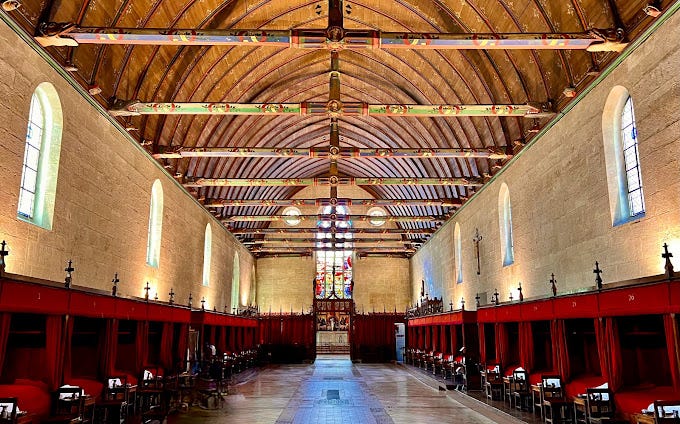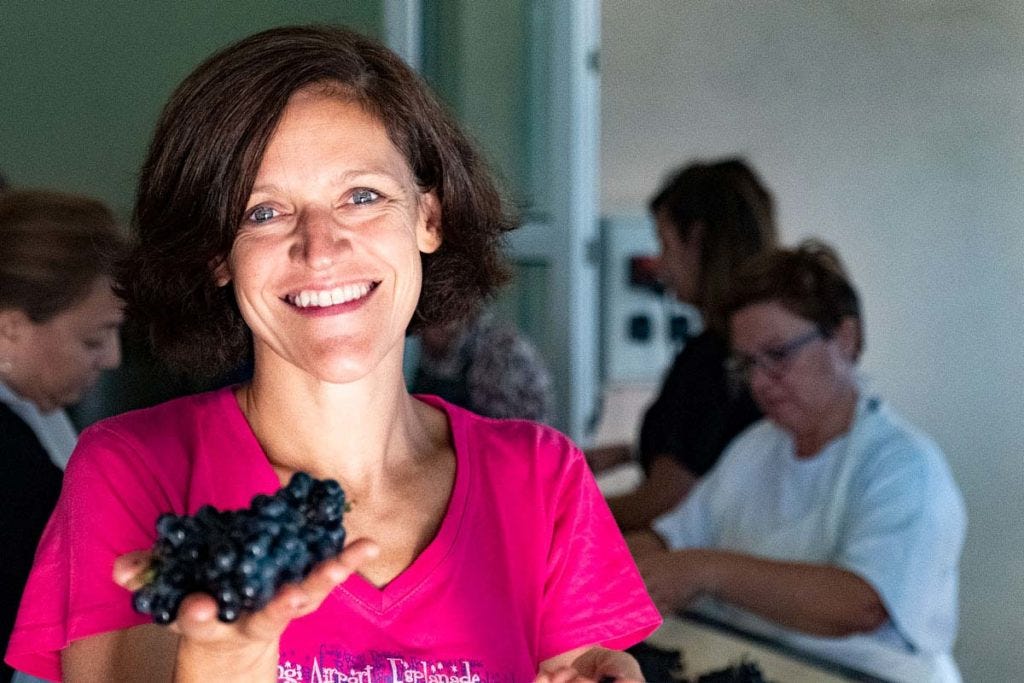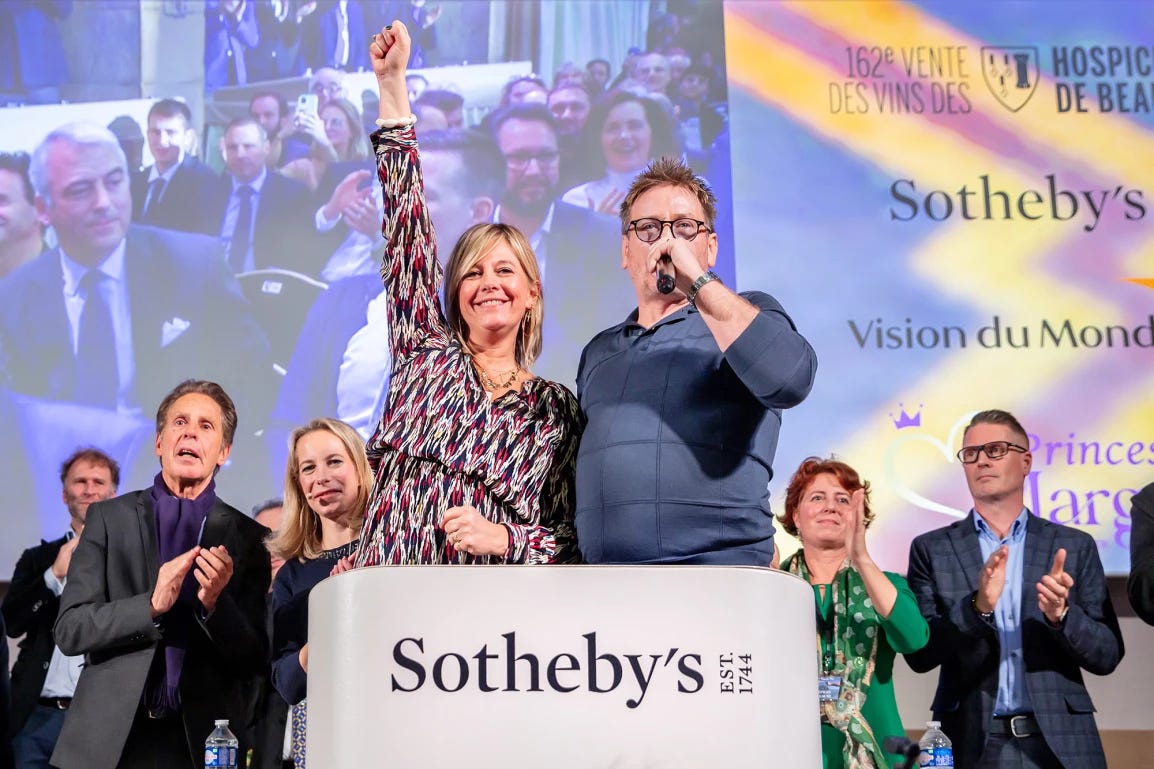Mark your calendars
Hospices de Beaune 2023 Charity Auction
UNESCO World Heritage Site
Takes place November 19th, in Beaune, France.
“The Hospices de Beaune, also known as Hôtel-Dieu de Beaune, is a former charitable almshouse in Beaune, France. Now it is a museum. It was founded in 1443 by Nicolas Rolin, chancellor of Burgundy, as a hospital for the poor. A charity auction takes place every year since 1859, on the third Sunday in November following a three-day celebration on the food and wines of Burgundy. It is the most well-known wine auction in France and sets the world record for being the World’s Oldest Charity Wine Auction.”

The wines produced by the Hospices de Beaune are from vineyards that are donated to the hospital. Through the generosity of estate owners in the area, local healthcare institutions and hospitals receive part of the proceedings of the charity auction.
The first winemakers in the Beaune region were local winegrowers who helped the nurses during the harvest and managed the vinification. Bourgogne wines are known around the world for their craftsmanship.
This year the Hospices de Beaune auction will also support research in longevity.
The Winemaker

“The Hospices de Beaune is first and foremost a public hospital that has built up a heritage of 60 hectares of vineyards over time and with successive donations. It was a century and a half ago that the Hospices de Beaune took the gamble of exploiting the growing vineyard with the aim of producing wines, the profits of which are donated to the institution. As their winemaker, I am, in fact, working for the hospital in my own way! I consider myself to be a link in this incredible chain dedicated to the service of a noble cause. In concrete terms, on a daily basis, my work consists of the management of the 60 hectares of vines that are tended to by 23 employees. It is important to know that the vineyard is very fragmented, with 117 plots, each one requiring careful attention.” Ludivine Griveau, Hospices de Beaune Régisseur
Since the 2015 Vintage, Ludivine Griveau is the winemaker of the Hospices de Beaune (the almshouse that turned to wine production to finance its costs and help the destitute who needed healthcare), today its charity auction supports medical research and major infrastructure projects in hospitals in the region.
The translation of her title of régisseur to the English word “winemaker” does not fully explain the scope of her work, for she is both responsible for the viticulture, the actual plants, the vines, caring for the whole growing cycle of the vineyards, and the vinification, making the actual wine. More like orchestrator? Conductor, an orchestra conductor.
She currently manages 60 hectares, spread from Chablis to Macon and around Beaune and surrounding villages (including Pommard, Volnay, and Meursault).
The Hospices estate is a mosaic of vineyards, managed in a sustainable way, and will be fully converted to organic in 2024.
Street Cred
1978: Ludivine Griveau is born in Saint-Rémy in Saône-et-Loire.
A graduate from the University of Dijon, she earns a double major as an agronomist and oenologist. She makes her final internships at Antonin Rodet in Mercurey and at Domaine Jacques Prieur, in Meursault, with winemaker Nadine Gublin’s.
2002: Winemaker for 6 months in Australia, at Rosemount Estate.
2004: Ludivine Griveau becomes Technical Director (chief winemaker) at Maison Corton André in Aloxe-Corton. She will stay there 10 years.
2014: She is awarded Winemaker of the Year at the International Wine Challenge for her white wines.
2015: Ludivine Griveau becomes the first ever women nominated as Régisseur du Domaine des Hospices de Beaune.
2016: Becomes a brother of Confrérie des Chevaliers du Tastevin.
2019: Awarded of the title of Chevalier de l’Ordre National du Mérite, a prestigious French civilian distinction.
Hospices de Beaune Organic Transition
Since 1995 no herbicides are used, ploughing is done in summer and winter and all treatments used to maintain the health of the plants do not pollute the environment.
Starting in 2008, almost all the grapes have been produced without the use of synthetic products and according to methods of organic viticulture. Harvesting is done by hand and the grapes are transported in small cases.

163rd Hospices de Beaune Wine Charity Auction
Sotheby’s, the world leader in wine auctions, is organising the 163rd Charity Wine Auction of the wine estate of the Hospices de Beaune, in Bourgogne, on Sunday November 19, 2023.
The 60-hectare estate is in its third and final year of organic conversion.
Alain Suguenot, mayor of Beaune and president of the supervisory board of the Hospices de Beaune said that this year the entire proceedings of the charity auction will fund hospitals’ infrastructure in the area as well as research on ageing and brain health: “This 163rd sale of Hospices de Beaune wines will be used to finance the investments in a hospital that is currently carrying out major infrastructure projects. It will particularly address research on the brain and genes that can delay aging.”

“Aging well is a theme dear to the Hospices Civils de Beaune. In fact, the establishment is engaged in a project with the EHPADs (French government subsidized public and private institutions for the care of the elderly) of the Groupement Hospitalier de Territoire du Sud, Côte d’Or. The first goal of this approach is to adapt the care offered to the needs of elderly people, to enable them to remain at home, in good health, for as long as possible.” said Marie-Catherine Moraillon, Interim Director of the Hospices Civils de Beaune.
The institution will support one or more NGOs using the proceeds from the sale of the President’s Barrel. Projects that focus on research on the pathologies of old age, and propose solutions for improving healthspan, will be selected.
“L’art et le vin servent au rapprochement des peuples.” Goethe
Tweet
